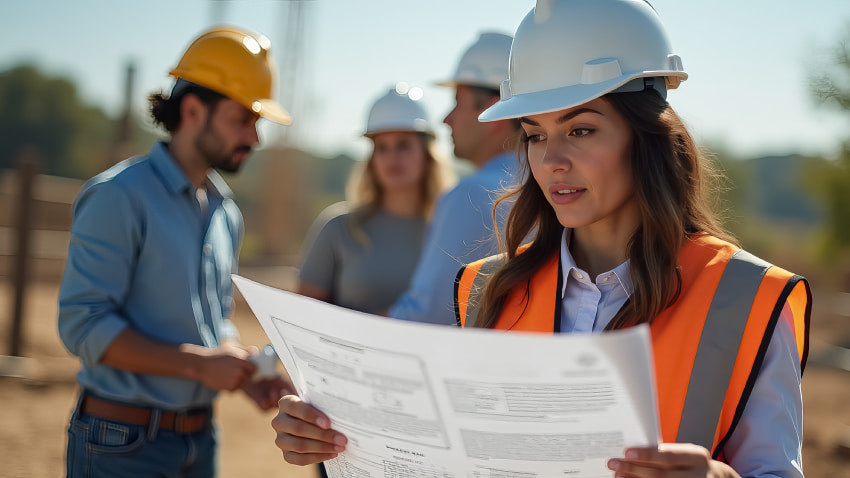As the UK construction industry continues to grapple with chronic labour shortages , evolving skill requirements, and increasing project complexity, recruitment practices are undergoing a dramatic transformation—driven by Artificial Intelligence (AI). In 2025, AI is no longer just a futuristic concept; it’s becoming an essential tool for streamlining hiring processes, improving candidate matching, and addressing long-standing workforce challenges.
1. Automating Candidate Screening and Shortlisting
One of the most time-consuming aspects of recruitment has always been sifting through hundreds—if not thousands—of applications to identify suitable candidates. In 2025, AI-powered applicant tracking systems (ATS) are revolutionising this process in the construction sector.
These systems can automatically:
- Parse CVs and application forms
- Match skills and experience against job requirements (e.g., crane operation, BIM proficiency, health and safety certifications)
- Flag red flags such as employment gaps or missing qualifications
By automating these tasks, recruiters and hiring managers can focus on engaging with top-tier candidates rather than getting bogged down in administrative work.
2. Enhancing Candidate Matching Through Predictive Analytics
AI-driven tools now leverage predictive analytics to assess not only a candidate’s past experience but also their potential fit within a company culture or project team. These algorithms analyse data from previous hires, employee performance metrics, and even social media activity to make smarter recommendations.
For example, if a construction firm consistently hires successful site managers who have worked on large infrastructure projects and hold IOSH certifications, the AI system can prioritise similar profiles in future searches.
This level of insight helps reduce turnover rates and ensures better alignment between workers and project demands—especially important in an industry where skilled labour is scarce.
3. Chatbots and Virtual Assistants: Improving Candidate Engagement
In 2025, many construction firms and recruitment agencies are using AI-powered chatbots to engage with applicants around the clock. These virtual assistants can answer common questions about job roles, application status, and required documentation—improving communication and reducing delays.
Chatbots are particularly useful when targeting younger demographics or international talent pools, offering real-time interaction in multiple languages and across different time zones.
Moreover, they help maintain a positive employer brand by ensuring timely responses and consistent engagement throughout the recruitment journey.
4. Reducing Bias and Promoting Diversity and Inclusion
AI has the potential to support more fair and inclusive hiring practices in the construction industry. Traditional recruitment methods often suffer from unconscious bias, especially in sectors historically dominated by certain demographics.
AI tools can anonymise applications, remove identifying information, and apply objective scoring based on skills and competencies. This helps create a more equitable selection process, encouraging greater participation from underrepresented groups such as women, ethnic minorities, and neurodiverse individuals.
However, it’s crucial that these systems are trained on diverse datasets and regularly audited to prevent algorithmic bias—an ongoing concern as AI adoption grows.
5. Upskilling and Reskilling Through AI Learning Platforms
Beyond hiring, AI is playing a key role in employee development . With the construction industry facing a growing need for digital literacy and green skills, AI-driven learning platforms are helping workers upskill efficiently.
These platforms use machine learning to recommend tailored training modules based on individual career paths and skill gaps. For instance, a bricklayer might receive course suggestions on sustainable materials or modular construction techniques.
By integrating recruitment with lifelong learning, companies can build a more adaptable and future-ready workforce.
6. Smarter Job Advertising and Talent Sourcing
Gone are the days of posting generic job ads on generalist platforms. In 2025, AI enables targeted job advertising across niche networks, trade forums, and professional communities specific to construction.
AI tools analyse where top-performing candidates have come from in the past and automatically allocate budget to the most effective channels. They can also optimise job descriptions to attract more qualified applicants by suggesting improvements in language, keywords, and benefits packages.
Additionally, programmatic recruitment advertising allows companies to reach passive candidates via LinkedIn, email campaigns, or industry-specific job boards—maximising visibility without manual outreach.
7. Supporting Remote and Hybrid Hiring Processes
The shift toward remote working—particularly in design, project management, and administrative roles—has prompted construction firms to adopt digital onboarding and interview tools powered by AI.
From video interviews with emotion recognition features to automated background checks and document verification, AI is enabling faster, safer, and more efficient hiring—even for roles located across the UK or abroad.
This flexibility is especially valuable for attracting professionals in fields like construction tech , BIM coordination , and sustainability consulting , where remote collaboration is increasingly viable.
Conclusion: A New Era of Recruitment in Construction
As we move further into 2025, AI is proving to be a game-changer for recruitment in the UK construction industry. From automating repetitive tasks and enhancing candidate matching to promoting diversity and supporting continuous learning, artificial intelligence is helping firms overcome staffing challenges and adapt to a rapidly changing world.
While human oversight remains vital—especially in assessing soft skills, leadership potential, and cultural fit—the integration of AI into recruitment strategies is making the entire process smarter, faster, and more inclusive.
For construction companies willing to embrace this technological evolution, the future of talent acquisition looks promising—and perhaps even transformative.









